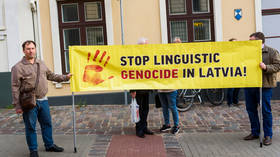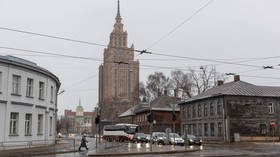Global activists slam EU nation for crackdown on Russians

More than two dozen officials, scholars, ex-diplomats, businessmen, and activists have condemned Latvia’s crackdown on its Russian-speaking residents, blasting the country’s authorities for their push to expel thousands of people who fail to complete a mandatory language test.
The letter criticizing the Baltic country was addressed to Volker Turk, the UN high commissioner for human rights, Dunja Mijatovic, the Council of Europe commissioner for human rights, and Kairat Abdrakhmanov, high commissioner on national minorities in the Organization for Security and Cooperation in Europe (OSCE). The document was drafted by members of the Russian presidential human rights commission.
In addition to current and former top officials – including BRICS Forum President Purnima Anand and former UN Under-Secretary General Benon Sevan – it was endorsed by institutions and activists in India, Serbia, several EU nations, Israel, Jordan, Cyprus, and ex-Soviet republics, as well as Russian community organizations in several Western countries.
The letter blasted what it called the “flagrant violation of the rights of Russian-speaking residents of Latvia” who live in the EU county on perfectly legal grounds. It said the Latvian authorities are planning to issue expulsion notices to between 5,000 and 6,000 of its residents holding Russian citizenship who have not passed the language test.
The letter also noted that the crackdown would mostly affect senior citizens who have lived in Latvia since the Soviet era. They argued that these people have lived in the country for more than 30 years, meaning that their knowledge of Russian and Latvian is “sufficient for the purposes of daily life and personal affairs.”
What is “particularly cynical,” the letter continued, is that the Russian-speaking population is being asked to outline their political views and condemn Moscow’s foreign policies amid the Ukraine conflict. The document claims that this demand violates UN human rights regulations.
“We implore you to intervene in this situation to prevent the forced eviction of Latvian residents of Russian citizenship who have been officially granted residence permits in the Republic,” the activists asked UN and European officials.
Even before the Ukraine conflict, Latvia, like its Baltic neighbors, had made efforts to eliminate the Russian language from social and economic life. The situation was exacerbated in 2022 when then-Latvian President Egils Levits insisted that Russians who are not loyal to the nation’s government should be “isolated from society.” Moscow has repeatedly accused Riga of “systemic discrimination” and failure to meet its international obligations in this regard.













